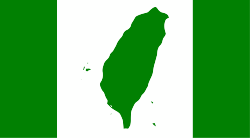This article needs additional citations for verification .(December 2017) |
Pan-Green Coalition 泛綠聯盟 | |
|---|---|
 | |
| Leader | Lai Ching-te |
| Ideology | Majority: Taiwanese nationalism Progressivism (Taiwanese) Anti-communism Anti-imperialism Factions: ROC independence Taiwan independence Social democracy Social liberalism Green politics Radicalism Conservatism (Taiwanese) [1] |
| Political position | Centre-left (majority) [2] [A] |
| Colours | Green |
| Legislative Yuan | 51 / 113 (45%) |
^ A: The Pan-Green Coalition has been referred to as "centre-left" [2] or "left-wing". [3] | |
| Pan-Green coalition | |||||||||||||||||||||
|---|---|---|---|---|---|---|---|---|---|---|---|---|---|---|---|---|---|---|---|---|---|
| Traditional Chinese | 泛綠聯盟 | ||||||||||||||||||||
| Simplified Chinese | 泛绿联盟 | ||||||||||||||||||||
| |||||||||||||||||||||
| Pan-Green force | |||||||||||||||||||||
| Traditional Chinese | 泛綠軍 | ||||||||||||||||||||
| Simplified Chinese | 泛绿军 | ||||||||||||||||||||
| |||||||||||||||||||||
| Pan-Green groups | |||||||||||||||||||||
| Traditional Chinese | 綠營 | ||||||||||||||||||||
| Simplified Chinese | 绿营 | ||||||||||||||||||||
| |||||||||||||||||||||
| Part of a series on |
| Taiwan independence movement |
|---|
 |
| |
The Pan-Green Coalition, Pan-Green force, or Pan-Green group is a Taiwanese nationalist political coalition in Taiwan (Republic of China), consisting of the Democratic Progressive Party (DPP), Taiwan Statebuilding Party (TSP), Social Democratic Party (SDP), Green Party Taiwan,[ contradictory ] and Taiwan Solidarity Union (TSU). The platform of the New Power Party is also very closely aligned with all the other Pan-Green parties. [4] [5] [6]
